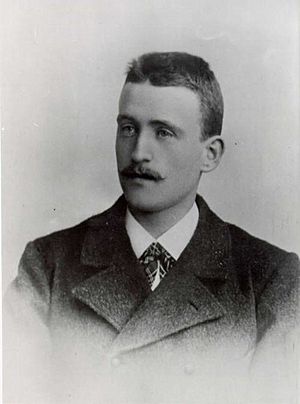Josip Murn facts for kids
Quick facts for kids
Josip Murn
|
|
|---|---|
 |
|
| Born | 4 March 1879 Ljubljana, Austria-Hungary |
| Died | 18 June 1901 (aged 22) Ljubljana, Austria-Hungary |
| Occupation | Poet |
| Literary movement | Fin de siecle, Symbolism |
Josip Murn, also known by his pen name Aleksandrov, was an important Slovene symbolist poet. He was born on March 4, 1879, and passed away on June 18, 1901. Along with Ivan Cankar, Oton Župančič, and Dragotin Kette, he is considered one of the founders of modernism in Slovene literature. Many people believe Murn was one of the most influential Slovene poets of the last two centuries, after France Prešeren and Edvard Kocbek.
Contents
Life of a Poet
Early Years
Josip Murn was born in the center of Ljubljana, which was then part of Austria-Hungary. He was born to a poor woman named Maria Murn. Soon after he was born, his mother moved to Trieste. She left him to be raised by relatives in the suburbs of Ljubljana. This is called foster care.
High School and New Ideas
As a teenager, Josip went to high school in Ljubljana. There, he met other young Slovene writers like Ivan Cankar, Dragotin Kette, and Oton Župančič. These friends were exploring new styles of European poetry. They were especially interested in a national literary movement called Slovene Moderna. This movement mixed ideas from different art styles like Naturalism, Impressionism, Decadence, and Symbolism.
Josip was a very talented student. He was shy but also very sure of himself. He started writing poetry at a young age and quickly became very skilled. A wealthy woman named Franja Tavčar noticed his talent. She was the wife of a well-known politician and writer, Ivan Tavčar. Franja helped Josip get a scholarship to study at the University of Vienna.
Time in Vienna
In 1898, Josip moved to Vienna. He spent a year there, mostly visiting literary cafés and art shows. He was greatly inspired by the Vienna Secession, which was a group of artists who wanted to create new art. During this time, he wrote a series of poems called Fin de siècle. This French phrase means "end of the century." In these poems, he shared his feelings about life in the big city, or metropolis.
Travels and Inspiration
In 1899, Josip moved back home to the Slovene Lands. He traveled around, spending several months in Upper Carniola. There, he watched how peasants lived their lives. He started to include themes from peasant life in his symbolist poetry. He didn't just use Slovene folk ideas. He also took elements from Irish, Scottish, Slovak, and Latvian folk stories.
Later, he traveled to the Austrian Littoral. He visited his mother in Trieste and lived for a short time in Grado. Then, he settled in the Vipava Valley for a while. It was there that he decided to use the pen name Aleksandrov. This name sounded like old Slavic peasant words. He wanted his poetry to be even simpler and more like impressionist art.
Final Days
In 1901, Josip settled in Ljubljana. He rented a small room in an old building by the Ljubljanica river. This building was an abandoned sugar factory, known as Cukrarna. Sadly, he died there at the age of 22 from tuberculosis. He passed away in the same bed where his friend Dragotin Kette had died just two years before.
Josip Murn is buried in the Žale cemetery. His tomb is next to those of Dragotin Kette, Ivan Cankar, and Oton Župančič. This area is known as the "monument of Slovene modernism."
Images for kids
See also
 In Spanish: Josip Murn Aleksandrov para niños
In Spanish: Josip Murn Aleksandrov para niños


